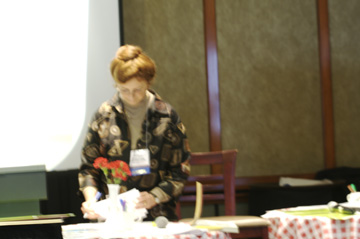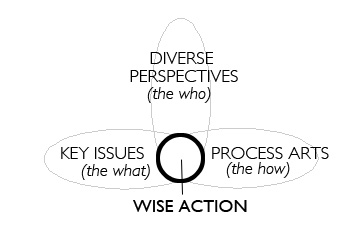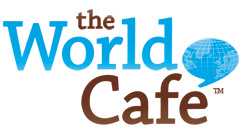(more videos of CARA here)
This wonderful morning break-out session at the 2007 Pegasus Systems Thinking conference in Seattle was an all-girl collaboration by Juanita Brown, Nancy Margulies and Nancy White (with me making up a silent fourth with my blog harvesting of the story).
“I grew up with crosses burned on my lawn” Juanita began, “a true child of the revolution with activist parents, but I didn’t call my talk Conversation as a Radical Act for that kind of politically radical reason. It came from a deeper exploration of what the meaning of the word radical means… which is getting down to the real root of the matter.”

The morning after the World Café was born in my living room with a
group of intellectuals from around the world exploring intellectual
capital, we came downstairs with our morning coffee wondering “What
happened there?!” We began to tape interviews with each other trying to
find out what it was that had brought out the ‘magic’ we’d each
experienced the night before. At some point I had an ‘aha’ and
connected what had happened there in my living room with the house
meetings I’d experienced in my early work with Chesar Chavez and the
United Farm Workers Movement. We met around tables in the kitchens of
humble farmhouses and our conversation traveled from house to house –
the new meanings that were being created through those conversations
started a social movement, and we had experienced something of that
flavor in our conversation.
My friend Meg Wheatley was an early supporter of my work and she
invited me to host a World Café at a conference that her organization, Berkana Institute, was putting on. While I was there I saw a quote by Chilean biologist Humberto Maturana in a talk by Fritjof Capra:
“We bring forth our worlds through the networks of conversation within which we participate.”
The power of these words struck me a very deep level and I wept as I
realized that the ideas we were exploring in the World Café were backed
by science and other people’s experience. What if we really could bring
forth a world of coherence and life-affirming meaning out of our
conversations?
What if the phrase “What we view determines what we do….” was true,
and we could change the core image of the social systems of which we
are all a part?
Juanita ends her introduction to Conversation as a Radical Act
by asking us to embrace the hypothesis that we could think of our
organizations and as webs of co-evolving conversations and
meaning-making.
* * *
The creative genius of Nancy Magulies stepped forward with an
exercise she said came straight from the 60s – a guided journey where
we imagined ourselves as beings who carry and are surrounded by
brilliantly colored fields of thought conveyed through conversation. An
interaction of colors that mix and swirl and change with our collective
experience of meaning-making, being breathed out into the air through
our voices to ultimately change the way we all see the world around us.
Nancy seeded the group conversation with Let’s assume that this
process is as powerful as we say it is; what one or two things could
you do to take advantage of this power of conversation, this
life-affirming practice?, asking us to write them down on cards.
and beautiful, and connect us with nature” and “imagine each person I
meet is perfect”.]
Then, instead of moving around to another table like we would if we
were in a World Café, our ideas move around instead as we exchange
cards with someone at another table and read them aloud to our
table-mates. The decibel level of conversation in the room goes up a
notch as people share the new perspectives they’ve received from each
other.
* * *
Nancy White appeared and invited us to use the energy in the
room, the unfinished quality that is still buzzing in the space between
us, to share these ideas with the whole.
Here is some of what people said:
- I noticed the similaritites – even to the color of pen we
chose, that flowed from one table to another. We all seemed to be
having the same issues… the languages were different but the ideas were
the same. My color was orange, for example, and I was addressing the
people who are on the margins, wanting to invite them into a safe
conversation. I received a card, also written in orange, saying ‘Invite
people from my five departments”. Well, I don’t have departments in my
work, but I too was wanting to use the café to bring in different kinds
of people
- This is a relational way of interacting, where we give something of
ourselves that is not of our ego. Realizing that we are part of a
larger whole, but not trying to convey a certain outcome.
- I’m seeing patterns in our attempts to create systems that are
integrated – it makes me think that we need to be integrated in
ourselves in order to create businesses that are integrated.
- Passing the images from one to the next, signals that get brighter as they go forward.
- Questioning, Connecting, Acting.
- Finding questions that travel well in the system that you are part of.
- Ask – and model – were themes that came through for many people.
- The pattern at our table was not complicated – just the need to talk. The organic open space to talk.
- Ours patterns were about talking to people differently than we normally do, and talking to different people.
- Going from “ask” to “listen”
- We kept seeing “sharing” and inviting people into the conversation that don’t usually talk.
- Speaking without fear and having trust for other people. We also
discussed why conversation is so valuable now – what have we lost for
it to feel so precious?
- Be open and honest, true to yourself; visual a positive future; be a catalyst.
Everything we have heard, Nancy points out, the common thread that
weaves through everything that has been said is all about the web of
conversation. "What are these threads that can connect us even when we
don’t know each other?" she asks. With the internet, we can now see a
conversation move around the globe at a rate we never could have
imagined before. Before most of us could only have an effect our own
areas of work or life; now we can change the world. These tools offer
the capacity to involve many more people in the conversation.
We’d like to invite you into spreading the ideas we’re coming up
with today… As an experiment we’ve created a wiki– a web page that
anyone can edit – to share our harvest today. Here’s the link:
http://conversationasradicalact.wikispaces.com
We’ll post the photographs from this session and if you leave us
your cards we’ll make patterns from them, photograph and post those
too.
Maybe you will have a look at the wiki and see the patterns that are
emerging from your ideas in combination with others… maybe you will
bring those patterns into a conversation in your own organization or
community or family.
"These ‘artifacts’", Nancy says "can be brought in to support the
conversation wherever you are and you too can be part of a conversation
that can change the way change is made…"
* * *
To close, Juanita says "Many people think of the World Café as
a process for holding great conversations." Yes, AND its deeper
potential is to share this large-scale possibility and to support us
acting in small ways within our own systems. Through this capacity of
conversation to transform itself, we know we are not alone.
Christopher Alexander says that all living systems are made up of
wholes at every level of scale, and that life-enhancing shifts in these
systems do not come from grand plans and edicts but from the repetition
of millions of small acts carried out throughout the system, whatever
its scale. Every act helps to repair some older, larger whole, but the
repair not only patches it, it modifies it, it transforms it and sets
it on the road to becoming something else, something entirely new.
That’s what we’re about here – co-evolving, sharing and re-shaping
our futures together. If we’ve brought ourselves to this place, there
is no reason we can’t go somewhere else. With the tools humanity has
created, we can make this change happen even faster than ever before.
Then Juanita shares a diagram of something she’s been working on:
As an experiment in ideas, to see how we can begin to inform our
co-evolution together of conversation as a radical act, just imagine
that conversation is the root act of this transformative process…
People are always talking about issues… but if we don’t connect
these issues to what Juanita is calling architectures of engagements –
those processes that bring new voices into the conversation – then
people are going to be working on the issues in the same ways we have
always done. We’ll create social movements, but we won’t necessarily be
creating wise action.
Imagine a key issue or question that you care about…
Put your issue on the left (the what), and on the right imagine the
how, or the approach or process by which you will engage people in
working it through, and on the top – the who, what are the voices that
you would like to bring into the conversation? Who needs to be at the
table in order to make sense of this issue?
Our hypothesis is that out of this interface, wise action will emerge.



Amy–this is SO exciting to see–how beautifully you captured the essence of these ideas…
what a gift!
Juanita
Ah Amy, how sweet the art of live blogging! Thanks for doing this!
Ria